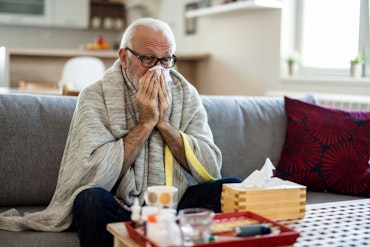Australians over 70 next in line for COVID-19 vaccine
The second phase of the COVID-19 vaccine rollout begins next week with older Australians aged 70 and over next in line for the COVID-19 vaccine.
![<p>The second phase of the Federal Government’s COVID-19 vaccination rollout will begin on Monday. [Source: iStock]</p>](https://agedcareguide-assets.imgix.net/news/articles/Next-Phase-for-vaccines-17_3_2021.jpg?fm=pjpg&format=auto&w=550&q=65)
The second phase of the Federal Government’s COVID-19 vaccination rollout will begin on Monday. [Source: iStock]
Over 1,000 general practices will now be involved in the vaccine rollout process next week to allow for more efficient distribution of the vaccine, however, the vaccination program’s new booking system launched today suffering technical issues due to demand and booking problems.
Phase 1b starts on 22 March with over six million people expected to be covered in the next vaccine grouping. Approximately 14.8 million doses of the AstraZeneca COVID-19 vaccine will be distributed during this phase.
The group includes older Australians aged 80 and over, older Australians aged 70 and over, Aboriginal and Torres Strait Islander people aged 55 and over, and other health care workers that were not included in the first phase of the vaccine rollout.
Minister for Health and Aged Care, Greg Hunt, says, “This rollout for Phase 1b complements the significant vaccination program underway to protect our most vulnerable citizens in Phase 1a, with approximately 200,000 vaccinated by the end of Tuesday.
“Australians eligible for Phase 1b will be able to find a vaccination provider through the new national vaccination information and location service at the Department of Health website.
“This will enable people to locate their nearest general practice providing General Practice Respiratory Clinic vaccinations and link through to their online booking system or phone number to make the appointment.
“General practices will play a major role in ensuring all Australians who seek to be vaccinated have access to safe and effective COVID-19 vaccines.”
The appointments available for booking on the service finder will increase as the involved general practices start to establish their systems and vaccine supply. As more local clinics get on board, there will be more appointments available in the future.
There will also be over 100 Aboriginal Health Services and 130 Commonwealth operated GP-led Respiratory Clinics acting as additional vaccine providers.
Alternatively, eligible people can book a vaccine appointment directly with a participating general practice as they normally would do if they were getting a flu vaccine.
Minister Hunt has acknowledged that not everyone will be able to get the vaccine straight away and appreciates people’s patience in waiting for their vaccination over the coming months.
“We are committed to making sure that every Australian that wants a vaccine will be able to be vaccinated,” says Minister Hunt.
“As the rollout moves into Phase two, additional general practices and selected community pharmacists will also participate in the program. No-one will miss out, whether they live in a city or country town or a very remote area.
“Vaccines are the game changer in our fight against the COVID-19 virus and I urge everyone in Australia to come forward and get vaccinated when they are able to. It will protect themselves, their family, and their community.”
The AstraZeneca vaccine has recently come into the spotlight after European countries started pulling the vaccine from circulation when concerns were raised that the vaccine was potentially causing blood clots in recipients.
Chief Medical Officer for Australia, Professor Paul Kelly, stated yesterday that the public should not be concerned about the recent reports and reiterated that the AstraZeneca vaccine is safe for use.
“I just want to make it very clear that here in Australia, safety is our first priority, and in any large vaccine rollout we do expect to see unusual events, and we monitor very closely and carefully for those,” says Professor Kelly.
“But this does not mean that an event that happens after vaccination has been given is indeed due to that vaccine. So we do always take it seriously, we do investigate, but in this situation I can absolutely say that I remain confident in the AstraZeneca vaccine, that it’s safe, and that there is, at this point, no evidence that it causes blood clots. No evidence that it causes blood clots.
“Blood clots happen. They happen in Australia fairly commonly. There’s about 17,000 cases of blood clots in Australia every year, so we do expect to see blood clots at the time when vaccinations are given. But, from my perspective, I do not see that there is any specific link between the AstraZeneca vaccine and blood clots.”
To read his full statement, head to the Department of Health website.
If you wish to book your COVID-19 vaccination, head to the Vaccine Eligibility Checker website.











![The new Aged Care Act exposure draft is slated for release in December of 2023, but advocates hope to see it rolled out on January 1, 2024. [Source: Shutterstock]](https://agedcareguide-assets.imgix.net/news/articles/wp/agedcareact__0811.jpg?fm=pjpg&w=520&format=auto&q=65)












Comments